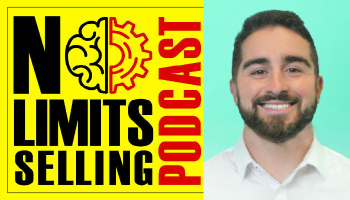Why Should You Take Ownership Of Your Success
On Episode 233 of The No Limits Selling Podcast, we have Alex Manwaring, Director of, the Sales Team at Privy. Alex Manwaring is the Director of Sales at Privy. He has 6+ years of sales experience and 3+ years of sales management experience. Before Privy, he worked at Mavenlink and Datadog. In his free time, he enjoys spending time with his fiancée Brittany and their Goldendoodle Daisy.
In this episode, Alex discusses why it's important to take ownership of your success.

Contact Alex:
[EDITOR’S NOTE: This podcast is sponsored by No Limits Selling. It is a fun, fast-paced podcast that delivers hard-fought business advice that you can implement today to improve your sales and performance]
Interested In Our Real Estate Coaching Services? Explore Our Website: Link
Feeling Not Well Today? You Can Use Our Mindset Boosters App To amp Up Your Mood: Link
Find us on Social Media:
LinkedIn | Facebook community | Instagram
Like what do you listen to? Subscribe to our podcast!
Ready to become fearless? We can help you become fearless in 60 days so you accomplish more in your career Schedule A 15 min Call with Umar
Summary
Introduction and Background
The podcast begins with an introduction of Alex Manwaring, a successful entrepreneur and business coach. Alex shares his background, detailing his journey from a struggling entrepreneur to a successful business coach. He talks about the challenges he faced in his early career, the lessons he learned, and how these experiences shaped his approach to business and coaching.
Alex's Approach to Business and Coaching
In the next section, Alex delves into his unique approach to business and coaching. He emphasizes the importance of mindset in achieving success, stating that a positive and resilient mindset is key to overcoming challenges and achieving goals. He also discusses the importance of taking ownership of your success with continuous learning and adaptability in business.
Challenges and How to Overcome Them
Alex then discusses the common challenges that entrepreneurs and businesses face. He shares his insights on how to overcome these challenges, drawing from his own experiences and those of his clients. He stresses the importance of perseverance, strategic planning, and effective decision-making in overcoming challenges that help you take ownership of your success.
Success Stories and Lessons Learned
In this section, Alex shares success stories from his coaching practice. He discusses the transformations his clients have achieved through his coaching and the lessons they've learned in the process. He has enabled hundreds of clients teaching them how to take ownership of your success. He emphasizes the importance of taking action, staying committed to goals, and maintaining a positive mindset.
Advice for Aspiring Entrepreneurs and Business Owners
Toward the end of the podcast, Alex offers advice for aspiring entrepreneurs and business owners. He encourages them to embrace challenges, stay resilient, and continuously learn and adapt. He also advises them to seek guidance and support when needed, stating that no one achieves success alone.
Conclusion
In this enlightening podcast, successful entrepreneur and business coach, Alex Manwaring, shares his journey from struggle to success, emphasizing the critical role of a resilient mindset, continuous learning, and adaptability in overcoming challenges. He provides insightful advice on tackling common business hurdles, underlining the importance of strategic planning and effective decision-making to take better ownership of your success. Through various success stories, Alex illustrates the transformative power of committed action and a positive mindset.
He encourages aspiring entrepreneurs to embrace challenges, seek guidance, and understand that success is a journey rather than a destination. The podcast serves as a powerful reminder of the importance of enjoying the journey, embracing challenges, and fostering continued growth and learning in the pursuit of taking ownership of your success.
Faq
Who is Alex Manwaring?
What is Alex Manwaring's approach to business and coaching?
What common challenges do entrepreneurs face according to Alex Manwaring?
What success stories does Alex Manwaring share in the podcast?
What advice does Alex Manwaring offer to aspiring entrepreneurs?
What is the key takeaway from Alex Manwaring's podcast?
Don’t miss this opportunity to transform your real estate career with one-on-one coaching. As an experienced real estate coach, I, Umar Hameed, am dedicated to helping you unlock your full potential and achieve your real estate goals. To learn more about who am I and my clients ↓
If you’re ready to take the next step, book an appointment with me today and begin your journey toward success in the real estate industry.
